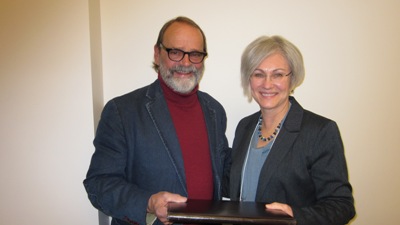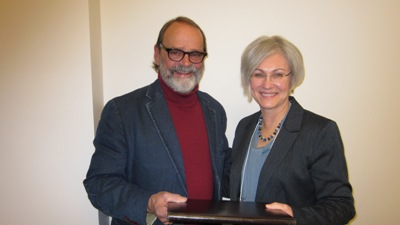 I offer my warm thanks to Dr. Charles Livesay, President Deborah Fristad, Past President Richard Ingram, the Board of ACDA-Michigan and to our current and past members. Receiving the 2011 Maynard Klein Award is a high honor that I humbly accept with deep and lasting gratitude.
I offer my warm thanks to Dr. Charles Livesay, President Deborah Fristad, Past President Richard Ingram, the Board of ACDA-Michigan and to our current and past members. Receiving the 2011 Maynard Klein Award is a high honor that I humbly accept with deep and lasting gratitude.
As a member of the ACDA-MI Board when the Klein Award was established, I had the distinct honor to present it formally to Dr. Harry Langsford in 1989 and to Professor Malcolm Johns in 1997. I am so proud to be included on the list of 24 distinguished leaders of the choral art in Michigan.
I am a lucky person. At the age of one-and-a-half, I was adopted by a family who recognized my musical aptitudes at a very early age. They had me singing in church by age 4, and my mom was my piano teacher until I started degree work at Wayne State University. I was lucky to have a high school band director, Ward Reid, who mentored me, taught me to read score and the basics of conducting. And Frank Irish, my high school choir director, gave me many opportunities to conduct.
My luck continued when, in 1958, I entered Wayne State University, where I met Trudy, my wife of over fifty years. I worked closely with Harry Langsford and Mac Johns, both of whom profoundly influenced me as an artist and a conductor, and I studied composition with Dr. Ruth Wylie. My luck continued as I took on my first professional choral directing position as assistant to Don Large and the Make Way for Youth Chorus of radio station WJR in Detroit. Shortly thereafter I joined the staff of Detroit’s Department of Parks and Recreation as music director of Civic Center Theatre. This led to me being selected By Dr. Amelita Bridges to join the leadership of Metropolitan Arts Complex, a City of Detroit Model Cities Cultural Arts Program.
In 1972, I began DMA studies at the University of Colorado-Boulder, where I was introduced to ACDA by Prof. Warner Imig, one of the founders of ACDA, and where I worked closely with Dr. Lynn Whitten and Dr. Walter Collins. Lynn and Wally each served ACDA as national presidents. I went to my first national convention in Kansas City and, subsequently I have attended most national and divisional conventions.
In 1976, I had the good fortune to join the faculty of Michigan Technological University as Director of Choral and Orchestral Activities. I enjoyed 33 years of music making with students and community members of the Concert Choir, Varsity Singers, Jazz Singers, Festival Chorus, and the Keweenaw Symphony Orchestra. I joined the Board of ACDA-MI early in my career at Michigan Tech and have served in many capacities, including State President (1995-97). My work with ACDA-MI has been enriched by the rich relationships formed with the officers, leadership, and the members.
At this point, you may ask, “If you’re so lucky, why did you work so hard?”
Well, here are a few reasons:
- To do my best to meet and exceed the expectations of all these wonderful people
- To validate their confidence and to earn their respect
- To meet the challenges of making the highest level of music with the people who trusted me to lead them
- To share the incomparable joy of learning and performing quality music of many genres
- And I wanted them to like me, too!
Early in my career at Michigan Tech, I quickly came to appreciate and value the time commitment that my ensemble members–many or whom were engineering or science students–were making to participate, usually at a sacrifice.
Here’s what I learned:
- Rehearsals are much more important than concerts
- Choose music carefully
- Like the music you’re working on
- Like the people you’re working with (not always easy!)
- Always come to rehearsal prepared
- Excellence is a goal; strive to achieve
- Recognize progress
- Talk less, conduct more
As a young conductor at Michigan Tech, a seasoned colleague told me this: “Milt, your audiences and your performers are going to tell you you’re wonderful; this performance was the best I’ve ever heard; you’re fantastic! Say ‘Thank you,’ but don’t believe them. You must always hold yourself to the highest standards.” I never forgot that sage advice, because it’s true.
As we look to the future, I believe that choral singing will be increasingly important. As society experiences the growing influence of technology and its control over so much of our lives, the bottom line is People need People. Human interaction.
Singing together, in pursuit of the highest artistic goals, is one of the ultimate human experiences.
“If music be the food of love, sing on.”
Milton Olsson
October 29, 2011

